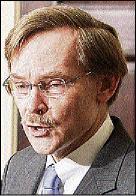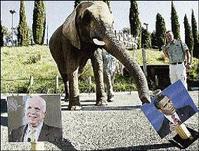
Robert Zoellick, Guest Writer
Aspiring United States politicians dream of being Franklin Delano Roosevelt (FDR), but rarely do the times and the person converge.
The next president will have the chance to be a 21st-century FDR.
For either Barack Obama or John McCain, the first duty will be to restore confidence. Hundreds of billions of dollars have been allotted to fix the financial breakdown; but fears have gripped the country.
Resolution to reassure
The new president needs not only a bold programme but also the resolution to reassure.
The parallels with FDR offer a striking starting point. The new administration will need to recapitalise banks. It will also need to offer millions of American families a lifeline by helping homeowners manage their mortgage debts while staying in their homes. This modernised New Deal would simultaneously extend a hand to the broad middle class while countering the continuing slide in house prices that continues to drive down communities, lenders' port-folios and trust.
The new president will need to overhaul a failed financial regulatory and supervisory system in a way that preserves innovation.
He will need to establish clearing and settlement mechanisms to ensure that failing firms do not freeze credit markets, to set strong liquidity as well as capital standards for the financial sector, and to thwart irresponsible behaviour.
And beyond all that, the new team will need a fiscal-stimulus package that the New Deal left out.
Political leadership is not just about programmes and bills. The new president will need to use his first hundred days to build his standing.
Reintroducing the us

Valerie, a 26-year-old female African elephant picks Democratic presidential candidate Senator Barack Obama, picture over Republican presidential candidate Senator John McCain, at Six Flags Discovery Kingdom in Vallejo, California, last Wednesday. The elephant is the symbol of the Republican party. - AP
He must point the way to use the United States' ingenuity and restored sense of purpose to build for the future quality schools, basic health-care choices and worker assistance to help citizens adjust to change in a competitive world; immigration rules that let the United States attract talent and, regenerate its spirit; and, more low-carbon technology to enable growth while protecting both the environment and national security.
Then, after opening the coffers of the US Treasury, the president will need to guide both Congress and the public to rebuild savings and responsibility.
The next president faces another historic challenge: reintroducing the United States to the world. He could make a good start by promptly sending the vice president and the new secretaries of state, Treasury and Defense departments to consult with countries large and small, developed and developing, on all continents.
In early 1989, Secretary of State James A. Baker III visited 15 NATO allies in eight days.
With four emissaries, the new president could reach 50 countries or more in his first months in office.
Those envoys should have a simple message: to listen and learn.
Of course, the new team should have some initial ideas and priorities to discuss, but taking the time to hear other world leaders' insights and concerns will prove as shrewd an investment as recapitalising the banks.
In 1944, FDR and the other architects of the post-war Bretton Woods system built for the future even as they fought the armies of the past.
A new bretton wood
The Bretton Woods generation left two legacies: first, international institutions, such as the World Bank and the International Monetary Fund (IMF); and, second, an intellectual and political commitment to act multilaterally to turn the problems of an era into opportunities.
The new president can build on that legacy by modernising multilateralism and markets.
A new Bretton Woods should start by recognising that the old G-7 club of the world's most industrialised nations needs to give way to a new steering group that includes rising economic stakeholders. Rather than return to mid-20th-century models, the new multilateralism needs to be flexible, not fixed.
New multilateralism
It must be pragmatic, too — maximising the strength of interconnected global actors, including not just existing institutions, such as the World Bank, the IMF and the United Nations, but also private-sector firms and NGOs.
In a networked world, we need networked multilateralism. That should be a litmus test for a Bretton Woods 2.0.
The new multilateralism will need to connect, for example, growth, development, trade, energy and climate change. The world expects to negotiate a new climate-change treaty by the end of next year, and that depends on recognising development interests while shifting to lower carbon growth.
To help the "bottom billion" in post-conflict and fragile states, the United Nations and the World Bank need to secure development with roots deep enough to break the cycle of fragility and violence.
Human rescue needed
A new president should build on his predecessor's financial innovations for development, including for HIV/AIDS treatment, the Millennium Challenge Corporation and the new Climate Investment Funds. The aftershocks of the developed countries' financial crisis and recession will also require the United States to work with other countries, the World Bank and the IMF to help the most vulnerable.
We need a human rescue, not just a financial rescue. With the global economy under stress, the world will be watching the president's commitment to cutting trade barriers and wasteful agricultural subsidies in the Doha World Trade Organization negotiation.
The rise of such developing economies as China and India provides the world with multiple poles of growth that can help a global recovery.
Effects on living standards
But the emergence of these big new economic players also serves as fodder for scaremongers, intent on whipping up fear about the effects on living standards in the developed world.
Some 25 countries in sub-Saharan Africa, with almost two-thirds of the region's population, boast growth rates that averaged about 6.6 per cent between 1997 and 2007.
A boom in what has historically been one of the world's poorest regions would be a great achievement, saving many of the bottom billion and freeing untapped talent and energy.
But it will be an achievement left unrealised unless a new president, as in times past, has the vision and the courage to stand up to the challenges of isolationism at home and to offer the leadership to help make it happen.
Both candidates have recognised the dangers in Afghanistan and Pakistan, but success will take more than troops. The earliest hard-edged test for the new administration will be synthesising security, governance, legitimacy and development in a long-term partnership with both countries and with a wider coalition, from NATO to China and India.
The most conspicuous signal the new president could send would be tackling the Middle East peace process. Security and democracy for Israel, combined with dignity, development and statehood for the Palestinians and peace with Syria, would transform a battered and brutal landscape, as well as relationships in the region. By now, all the parties know the basic terms of the deals, but only the United States can bring the parties together and organise the supporting political, security and economic embrace.
With peace, we can secure development and regional integration for the many millions in the Middle East who are being left behind.
A successful wind down in Iraq, a path of progress for Afghanistan and Pakistan, and a push for peace and development in the Middle East will also set the context for achieving broader peace and security in the region.
All in all, a tall order. But so was FDR's.
Robert B. Zoellick is president of the World Bank Group.

